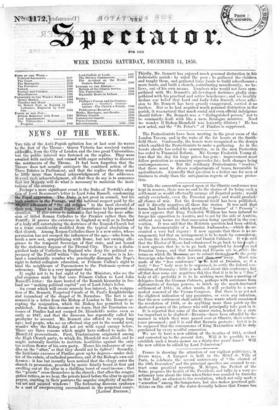_ NEWS OF THE WEEK.
TILE tide of the Anti-Popish agitation has at last sent its waves to the foot of the Throne : Queen Victoria has received various addreigs, from tike. City of London and the two great Universities; but the public interest was fastened on the replies. They were awaited with anliety, and Conned with eager scrutiny to discover the sentiments of:the Throne. It had been forgotten that the Throne does not--usnally anticipate the combined action of the Three Estates in. Parliament, and that the replies therefore must be little more than formal acknowledgments of the addresses. Beyond such acknowledgment, all that they do say is to announce that h-er Majesty -will do what is necessary to maintain the insti- tutions of the country. Pet haps a more significant event is the Duke of Norfolk's adop- tion of Lord Beaiimont's letter to Lord John Russell, condemning the Papal aggression. The Duke is not great in council, but his 111glipasition in the Peerage, and the habitual respect paid by the ',-1.'Slt-ii.dhcrents of "the old religion " to the most elevated of their sect, impart no small degree of importance to his preSent de- claratiun. It also serves to indicate, a fact beyond the mere adhe- sion of titled Roman Catholics to the Premier rather than the Pontiff; it- roves the existence in England as well as in Ireland of a body still entertaining the doctrines of the Romish Church but in a sense considerably modified from the typical absolutism of that church. Among Roman Catholics there is a new order, whose persuasion has not escaped the influences of the age,—who form in truth a new sect, sympathizing with Rome, but not owning alle- giance to the temporal Sovereign of that state, and not bound by the stationary dogmas of the Eternal City. There is a distin- guished body-of Catholics in England who deny_ the political su- premacy of the Pontiff within " the four seas " • as there is in Ire- land a considerable number who practically disregard the Pope's right to forbid collegiate education, or Primate Cullen's right to hind the neighbours of Parsonstown to the Ptolemaic system of astronomy. -This is a very important fact. It ought not to be lost sight of by the Ministers, who see the glad response made by that same Primate Cullen to Lord John Russell's letter : the more heated of the Romish hierarchy in Ire- land are "making political capital" out of Lord John's letter.
An event which will create scarcely less interest, is the resigna- tion of Mr. Bennett, Perpetual Curate of St. Paul's Knightsbridge and incumbent of the chapel of St. Barnabas. The fact is an- nounced in a letter from the Bishop of London to Mr. Bennett ac- cepting the resignation, which the Bishop has permitted to be
published. From document we learn, that the Tractarian ex- cesses of Pimlico had not escaped Dr. Blomfield's notice even so early as 1847, and that the diocesan has repeatedly called his presbyter to account. Mr. Bennett also offered to resign long as ; and people, who see an effectual stop put to the scandal now, wonder why the Bishop did not act with equal energy before. There are three reasons which might have sufficed to make Dr. blomfield procrastinate. First, Tractarianism originated among the High Church party, to which_Dr....Blomfield was allied, and he might naturally hesitate to institute hostilities against the only too zealous flower of his own party. Hence his endurance of can- dles on the "altar," so that they should not be lighted ! Secondly, the histrionic excesses of Pimlico grew up by degrees—under shel- ter of the rubric, of cathedral practices, and of the Bishop's own suf- ferance : it has but recently been noticed that the clergy enter the church in procession, preceded by music faintly heard at first and swelling. out at the altar in a thrilling burst of vocal incense ; that the " priests " cross themselves in the church ; that after the congre- gationretires, as we hear, the priests kneel before the altar in special prayer, courting in their _postures the angular simplicity of medim- val art and painted windows ! The forbearing diocesan confesses- to a sort -of overpowering encroaphment in the perpetual curate.
_
Thirdly, Mr. Bennett has enjoyed much personal distinction in his fashionable parish : he aided the poor ' • he gathered the children and taught them, and gathered large funds to build schoolhouses ; more funds, and built a church, contributing munificently, we be- lieve, out of his own means. Numbers who would not have sym- pathized with Mr. Bennett's all-developed doctrines gladly sym- pathized with his practical and active beneficence ; and we heartily declare our belief that Lord and Lady John Russell, whose adhe- sion to Mr. Bennett has been grossly exaggerated, carried it no further. But as he had acquired much personal distinction in the parish, it was natural that much social and even official indulgenoe should follow : Mr. Bennett was a " distinguished person," not to be summarily dealt with like a mere Boulogne minister. Need we wonder if Bishop Blomfield was leniently dilatory P He has now acted, and the " St. Peter's " of Pimlico is suppressed.


























